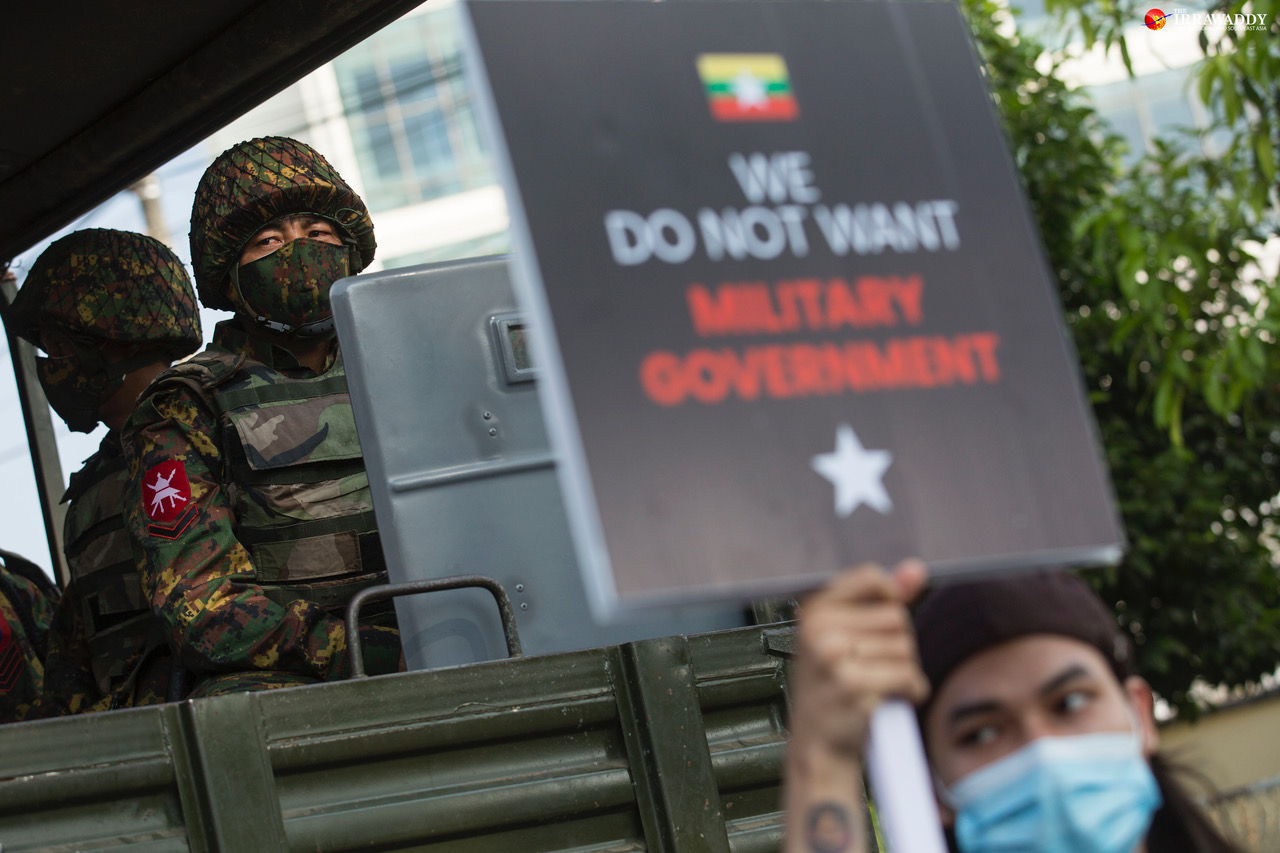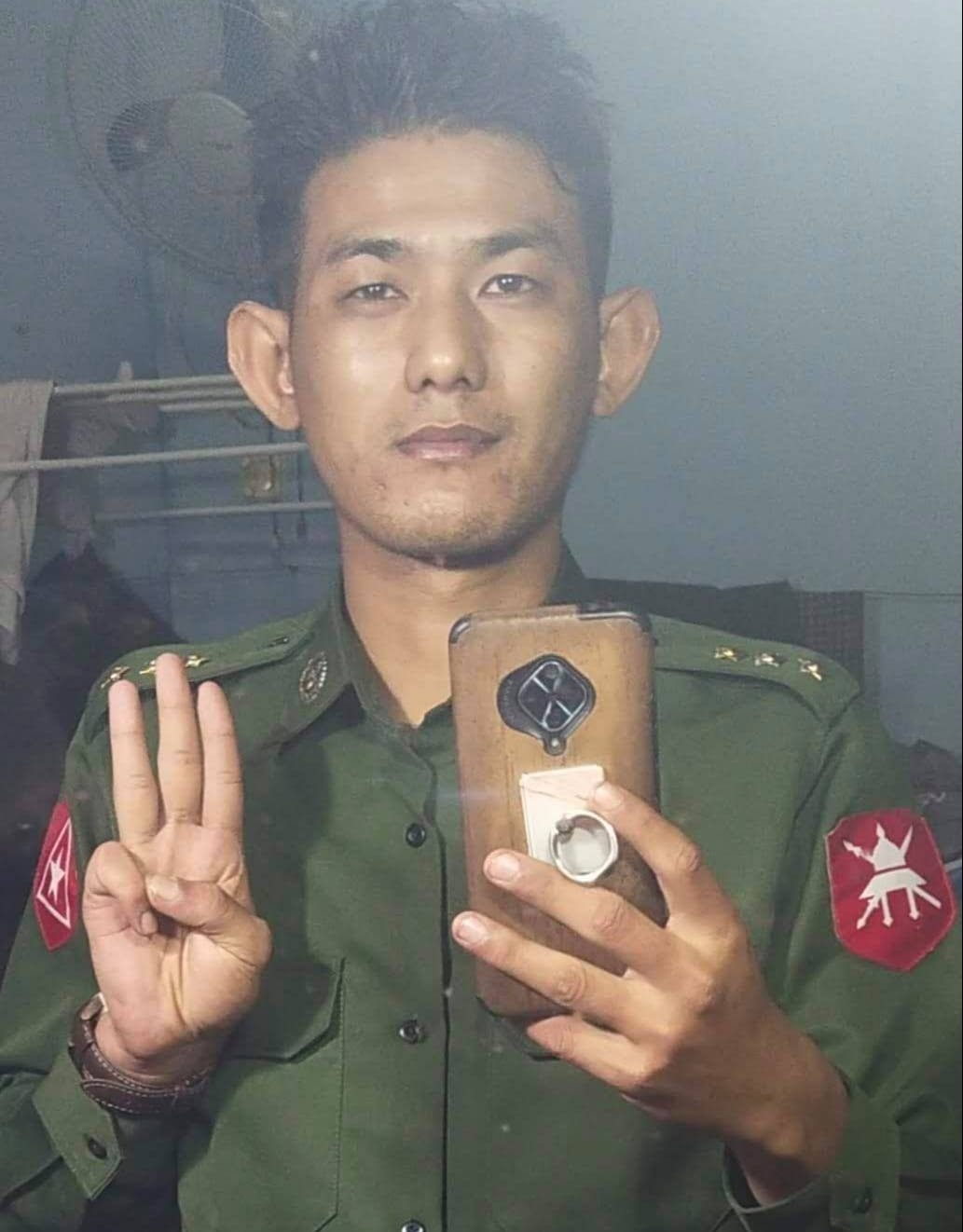Defectors from the Myanmar military and police force have echoed the recent call by the prime minister of the National Unity Government (NUG) for junta troops to join the resistance movement, warning their former colleagues that they may be running out of time.
NUG Prime Minister Mahn Winn Khaing Thann on March 30 warned regime military and police personnel who continue to protect the “terrorist generals” to defect while there is still an opportunity.
He added in his speech that the time is fast approaching when they will need to make a final decision on where they stand.
Military and police personnel who have joined the country’s Civil Disobedience Movement (CDM), a nationwide boycott by Myanmar civil servants of the regime following its takeover, said they agreed with the civilian leader’s call.
They said enough time has been given to those serving under the murderous junta.
Captain Lin Htet Aung, who joined the CDM in March 2021, one month after the coup, and now helps other defectors join the movement, warned regime forces that the junta’s military will inevitably lose, and its defeat was just a matter of time.
“Today, the military is experiencing the worst period in its entire history,” the defector officer said.
Captain Htet Myat, who joined the movement in June 2021 and is also currently working to assist other military and police defectors, echoed the call for junta troops to join the movement.
Just over 14,000 military troops and police officers were participating in the CDM as of the end of March, according to the NUG.
This is still only around 2.5 percent of the Myanmar junta military’s total troop strength, which is estimated at around 500,000, according to the World Bank and other international bodies.

The captains said that while a figure of over 10,000 defectors is indeed still quite high, it is not as many as the people had hoped for.
Capt. Htet Myat told The Irrawaddy that if the resistance forces could put more military pressure on the junta in the coming months, the number of military and police personnel willing to defect and join the CDM could climb.
However, he stressed the need for greater support for defectors.
More protection, support needed
The military CDM participants told The Irrawaddy that there were very limited resources available to provide the necessary support for additional military and police defectors and their families.
They said they needed to cover the security, safety and living needs of the defectors and their relatives. Many existing military and police CDM participants and their families are facing difficulties, they said.
Capt. Htet Myat said resistance stakeholders, especially the NUG and other anti-regime bodies, had put a lot of energy into encouraging junta troops to join the CDM, but added that efforts to persuade soldiers they are fighting for the wrong cause are not what’s needed.
“Many troops keep serving the junta even though they don’t like it,” he said.
Capt. Htet Myat suggested to the responsible bodies, including the NUG, that their efforts would be better spent finding ways to support those who do join the CDM.
The NUG has admitted that it is still only able to help about 6,000 of the more than 14,000 military and police CDM participants. In many cases, it says, this is because the defectors and their families haven’t been able to connect with the NUG to get the support. For those registered with it, the NUG provides monthly financial support, accommodation, and help finding new jobs and education for their children.
NUG ministers say they face numerous difficulties and restrictions in assisting the striking military and police personnel, especially in terms of funding and being able to access them, while it is often difficult for the defectors to reach safe or liberated areas.
The military personnel participating in the CDM explained that most of them have to rely on donations and other support from ordinary people and Myanmar expatriates.
A former military sergeant said he endured the toughest period of his life after he fled the barracks with his family to join the movement, adding that this was one reason he has not been more vocal in calling on his former colleagues to follow his lead.
“It has been quite difficult for us to tell them [those who no longer want to work for the junta]: ‘So just leave,’” said Capt. Htet Myat. “If we call on them to just come out, we are responsible for protecting them and taking care of them.”
Barriers, brainwashing and threats
According to figures from the NUG’s Ministry of Defense, at least 30,000 junta troops have died in clashes with the people’s resistance forces, ethnic revolutionary organizations (EROs) and ethnic armed organizations (EAOs) since the coup.
With the regime suffering such heavy losses across the country, the junta troops themselves do not want to keep serving the regime on the ground, the military defectors said. However, they are not abandoning the barracks yet due to the threats to their own security, the defectors added.
The CDM captains explained that they were able to join the CDM after contacting People’s Embrace, a group that helps defectors, and registering.
In Myanmar, the term “watermelon” has become a widely used euphemism for those who remain employees of the junta but who help the popular resistance in whatever way they can.
Capt. Htet Myat said that although the “watermelons” are not able to leave their posts at this moment, they are assisting the revolution by providing vital information to the resistance, adding that these soldiers should be spared any punishment after the revolution succeeds.

Capt. Lin Htet Aung added that the junta is spreading fake news about the CDM among the troops as part of its propaganda and brainwashing efforts, which increase every day.
Citing information provided by resistance spies and informants, he said the junta has threatened those who join the CDM with death, while troops are barred from contacting people living outside of their military communities. Soldiers also have to worry about the safety and livelihoods of their families.
Despite these challenges, new military and police deserters emerge occasionally.
On April 3, three troops from Light Infantry Battalion 101 and four police officers based in Myaing Township, Magwe Region defected, according to the Myaing Township People’s Defense Force (PDF).
“They defected to us, bringing their guns along with them. They contacted us a few months before they defected, and we remained in communication with them,” said Bo Letyar, the leader and spokesperson of Myaing PDF.
Myaing PDF awarded over 70 million kyats (around US$33,300) to the seven defectors as a reward for their participation in the resistance movement. The defectors have been sent to a safe area.
The defector captains urged their former colleagues in the junta’s military and police force to take the opportunity offered by the NUG’s invitation and reach out to the People’s Embrace group and join the CDM en masse before the door closes.
Capt. Lin Htet Aung acknowledged that joining the CDM may not seem like much of a reward, given that it too requires a huge sacrifice.
“But everyone needs to participate and struggle together if we want a better future for the country,” he said.
A 23-year-old male student in Mandalay who walked out of his classrooms at the University of Mandalay after the coup said that the ordinary citizens of the country continue to have high hopes that military and police personnel will join the CDM.
“If all of them actually joined the movement, we wouldn’t even need to fight a war against the junta and we could easily take power back from Min Aung Hlaing and send him to jail,” he said.

















